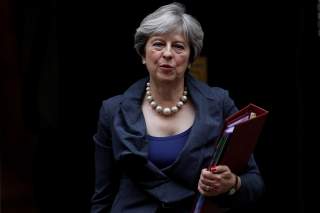Are the British Preparing to Join NAFTA?
London might be desperate enough to try to join NAFTA.
The British are coming, the British are coming! Or are they? The Telegraph reported Tuesday that Theresa May’s government is considering joining NAFTA if the United Kingdom is unable to secure a formal departure deal with the European Union. In the wake of the June 2016 Brexit vote, the prime minister, who succeeded a humiliated David Cameron, has repeatedly insisted no deal is superior to an unfair deal from Brussels (which it has every incentive to propose, lest other nations think they can leave the union easily).
A British foreign ministry official told me on Monday that from Number 10’s viewpoint, there are many ways London can strengthen its trade and investment relationships with partners across the world and argued that a range of options are available to the U.K., a top-ten economy.
A spokesperson for the British Department for International Trade said much the same. “As the prime minister made clear in her conference speech—we are confident that we will find a deal that works for Britain and Europe too,” the spokesperson told me. “But it is our responsibility as a government to prepare for every eventuality, and that is what we are doing.”
That Conservative Party conference speech last week, of course, was roundly feted as a fiasco for May. But for now, she remains at the helm of her government, and prominent observers think she’ll hold on, however implausible. “What protects Mrs May,” writes Janan Ganesh in the Financial Times, “is the suspicion among Tories that no leader can reconcile their differences on Europe. If the party is to be riven regardless, why bother with a change?" Katy Balls at the Spectator seems to agree, arguing that May’s current level of support in opinion polls seems sticky. Says Ganesh: “The prime minister can last as long as her absorptive capacity for punishment holds up.”
That “punishment” could take the form of the prime minister pursuing a course once unthinkable: seeking to join the now-beleaguered North American Free Trade Agreement, an accord the president of the United States has called the worst in history.
Such a move has “been a longstanding wish among Eurosceptics,” Freddy Gray of the London Spectator tells me. “I think [British Secretary of State for International Trade and leading Brextier] Liam Fox et al have always been Atlanticists first, long before Brexit.” Still, Gray detects an irony: “It's an interesting interpretation of 'taking back control'—the Brexit mantra—if we swap EU membership with an multilateral Americas alliance group.”
A common theme from other observers is that consideration of such a move obviously shows desperation on the part of the British government. The Conservatives “are just trying to show the EU negotiators that they have alternatives to a deal,” Tom Rogan, an editorial writer at the Washington Examiner who frequently writes on British politics, tells me. “It's desperation at this point.”
Clayton Clemens, professor of European politics at the College of William & Mary, echoes Rogan: “Frankly, it looks like a sign of how increasingly desperate Brexiteers are to conjure up a cost-free scenario for pulling out of the EU cold turkey.”
The nature of the politics surrounding Brexit at this point “seems like a bit of a hallucination,” says Clemens. For many, the notion of UK membership is preposterous on its face because Trump may very well pull the United States out of NAFTA, or be so demanding in his renegotiation demands that he basically forces Canada or Mexico out.
“Is there still going to be a NAFTA?” asks Eric Farnsworth, the Washington director of the Council of Americas and a former State Department and U.S. Trade Representative official, in comments to me. “I guess I’d say that they need to look before they leap . . . the NAFTA negotiations this week will be telling in terms of whether the three North American governments would be in a position at some point to expand the group.”
President Trump and May spoke by phone Tuesday, as did Secretary of State Rex Tillerson and UK foreign minister Boris Johnson. Also notable is that on both sides of the Atlantic, these two nations’ leaders, once linchpins of stability in the international order, have been openly feuding with their top diplomats. The emerging consensus, of course, is Tillerson is a marked man, and that Johnson—who wants a far bolder Brexit than May—remains an omnipresent rival to May and potentially existential threat to her premiership.
Quite the crew charged with negotiating the most hotly-debated and important international agreements in a generation.
Curt Mills is foreign-affairs reporter at the National Interest. Follow him on Twitter: @CurtMills.
Image: Reuters
Recommended:
Why North Korea's Air Force is Total Junk

